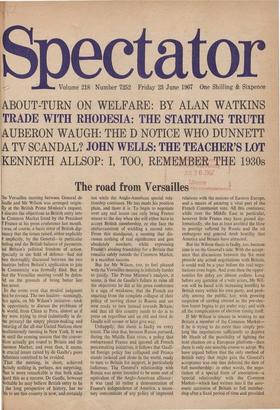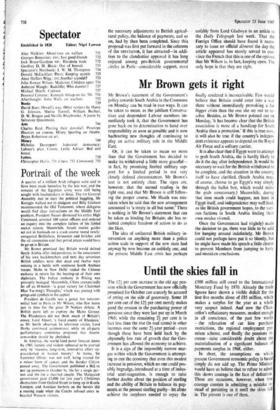The road . from Versailles - .:.. ra yxmot he Versailles meeting between General
de aulle and Mr Wilson was arranged origin- y at the British Prime Minister's request, discuss the objections to British entry into e Common Market listed by the President France at his press conference last month. was, of course, a basic error of British dip- macy that the issues raised, either explicitly implicitly, by the General—in particular ruing and the British balance of payments, d Britain's political freedom of action, pecially in the field of defence—had not en thoroughly discussed between the two untries before Britain's application to join e Community was formally filed. But at ast the Versailles meeting could be defen- on the grounds of being better late an never.
In the event even that modest judgment ust be revised. The two leaders—seemingly, not while the Anglo-American special rela- tionship continues. He has made his position plain, and there it is. To begin to negotiate over any real issues can only bring France nearer to the day when she will either have to accept British membership, or else face the embarrassment of wielding a second veto. From this standpoint, a meeting that dis- cusses nothing of real significance and gets absolutely nowhere, while expressing France's abiding friendship for a Britain that remains safely outside the Common Market, is a manifest success.
But for Mr Wilson, too, to feel pleased with the Versailles meeting is infinitely harder to justify. The Prime Minister's analysis, it seems, is that de Gaulle's failure to raise all the objections he did at his press conference is a sign of weakness; that the French are smarting from the complete collapse of their policy of moving closer to Russia and are now ready to turn instead towards Britain; and that all this country needs to do is to press on regardless and an old and tired de Gaulle will sooner or later give way.
Unhappily, this thesis is faulty on every count. The idea that, because Russia pursued, during the Middle East crisis, a policy that embarrassed France and ignored all French peacemaking initiatives, it follows that Gaull- ist foreign policy has collapsed and France stands isolated and alone in the world, ready to turn to Britain for support, is particularly ludicrous. The General's relationship with Russia was never intended to be some sort of equivalent of the Anglo-American alliance : it was (and is) rather a demonstration of France's independence of America, a neces- sary concomitant of any policy of improved the necessary adjustments to British agricul- tural policy; the balance of payments, and so on, had by then been completed- Since this proposal was first put forward in the columns of the SPECTATOR, it has attracted—in addi- tion to the clandestine approval it has long enjoyed among pro-British governmental circles in Paris—considerable support, most notably from Lord Gladwyn in an article in the Daily Telegraph last week. That the Foreign Office should have found it neces- sary to issue an official dementi the day the article appeared has merely served to con- vince the French that this is one of the options that Mr Wilson is. in fact, keeping open. The only hope is that they are right.































 Previous page
Previous page